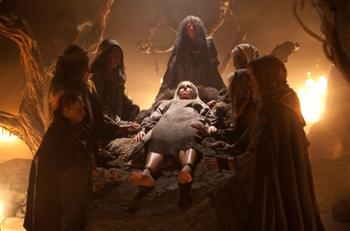
Heidi (Sheri Moon Zombie), a radio personality in Salem, Mass., with a rocky drug-filled past, is delivered a mysterious vinyl record, one that, when played, unleashes a host of demonic apparitions that began to tear Heidi down to her core. Meanwhile, Francis, a local town historian (played by Bruce Davison) who’s interviewed on Heidi’s show is intrigued by the record and begins digging to find clues as to its origin, only to come upon incredibly sinister implications that date back to Salem’s seventeenth-century witch trials.
Odds are, you either love Rob Zombie’s films or absolutely hate them. He is arguably the most polarizing filmmaker working in Hollywood today, and this film certainly does not help the case. That being said, if you know what you’re getting into, you might be in for a surprise. Lords of Salem is easily Zombie’s most ambitious and epic film to date.
One glowing aspect worth noting is that this film essentially works as one giant love-letter to Italian horror films of the ’70s, in particular the filmography of horror maestro Dario Argento. So much so, that this film could almost work as a loose remake of the 1977 horror masterpiece Suspiria. The lush cinematography, inventive use of color, and witchcraft plot are all highly reminiscent of this unique sect of foreign film, and had the horror movie buff in us giddy with excitement.
The cast is filled to the brim with Zombie’s usual suspects: Sid Haig, Ken Foree, Dee Wallace, Maria Conchita Alonso and, of course, Zombie’s wife; an array of performers who tend to only show up on the silver screen when Zombie makes another film. One look at this film will prove why; they’re all more or less terrible actors. They would work fine within the confines of a cheesy B-movie, but with the dark and serious tone Zombie strives so hard for, most of their dialogue just comes off as hilariously inconsistent.
Although Zombie seems to have mastered his own filmmaking style, his screenwriting skills still have room to grow. Plot points are dropped erroneously, characters wander in and out of the story, and the story as a whole comes off as if it were a rough draft of something that could’ve been much more.
Nevertheless, the film also marks a notable departure for Zombie. His previous outings (Devil’s Rejects, the Halloween remake and its sequel), are notable for being filled with over-the-top profanity, massive amounts of gore and staggering body counts. Here, Zombie shows he is willing to step out of his comfort zone. Viewers will be shocked to see that Lords of Salem is actually not gory at all, and instead of coming off like some demented fantasy from the tortured mind of a 14-year-old who hates the world, actually rolls out at a slow pace, creating a unique horror epic with a surprising amount of artistic and intellectual merit.
Growing up, we heard the age-old saying, “Even if you fail, at least you tried.” This can be applied heavily here. Lords of Salem is not, by any means, a great movie. But writer/director Rob Zombie, while still managing to maintain the unique style his fans know and love, stepped out of his comfort zone and took a huge leap of faith. The result is one of the most starkly beautiful and surprisingly artistic horror epics to come out in years, one that is guaranteed to stick in your head long after you’ve left the theater. In our book, it was a strong attempt indeed.













